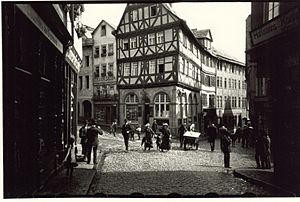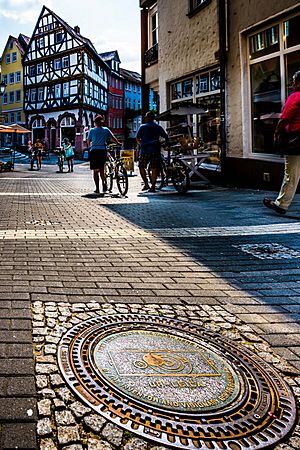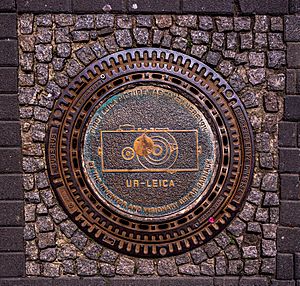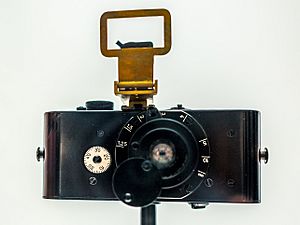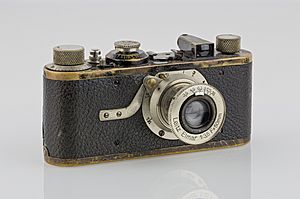Oskar Barnack facts for kids
Quick facts for kids
Oskar Barnack
|
|
|---|---|
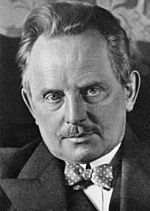
Oskar Barnack
|
|
| Born | 1 November 1879 Lynow, Nuthe-Urstromtal, Kingdom of Prussia
|
| Died | 16 January 1936 (aged 56) Bad Nauheim, Germany
|
| Nationality | German |
| Occupation | Engineer |
| Engineering career | |
| Projects | Camera |
Oskar Barnack (born November 1, 1879 – died January 16, 1936) was a clever German inventor and photographer. He is famous for building the first successful 35mm still camera. This camera was later called the Ur-Leica. He created it in 1913 while working at the Leitz factory in Wetzlar, Germany.
Contents
Life and the Leica Camera
Oskar Barnack worked as an engineer at the Leitz company. He had asthma, which made it hard for him to carry heavy cameras. This gave him an idea: what if cameras could be smaller and lighter? This way, he could take photos more easily when he traveled.
In 1913, Barnack started working on his idea. He decided to use 35 mm movie film for still photos. This was a big change because movie film was much smaller than the film used in other cameras.
A Revolutionary Camera Design
Barnack's design was very new. He made the camera transport the film horizontally. This allowed for a larger picture size of 24x36 mm. Most other 35mm cameras at the time carried film vertically, making smaller pictures (18x24 mm).
The larger negative meant that photos could be made sharper when enlarged. But for this to work, the camera needed a very good lens. This lens had to be able to capture clear images on the bigger film size.
Finding the Perfect Lens
Finding the right lens was a challenge. Existing lenses for 35mm cameras were too small. They didn't cover the whole 24x36 mm area. Barnack and his team needed a special lens just for his new camera.
The first good lens for the Leica was a 50 mm f/3.5 design. This lens later became known as the famous Leica Elmar series.
The Birth of the Leica I
In 1923, Barnack showed his invention to his boss, Ernst Leitz II. He convinced Leitz to make about 31 test cameras. These cameras were given to photographers to try out.
Even though some people weren't sure about the new camera, Ernst Leitz decided to produce it. In 1925, it was shown at the Spring Fair in Leipzig. It was a huge success and was named the Leica I. The name "Leica" comes from Leitz Camera.
Barnack as a Photographer
Oskar Barnack was also a talented photographer. He was one of the first to take news photos that showed people in their surroundings. He took the first news photo with a 35mm camera. It showed a flood caused by the Lahn River in Wetzlar.
The Leica Oskar Barnack Prize
In 1979, to celebrate 100 years since Oskar Barnack's birth, the Leica Oskar Barnack Prize was created. This award is given to professional photographers.
What the Prize is About
The prize honors photographers who capture the relationship between people and their environment. They must show this connection in a series of 10 to 12 images. The photos should be creative and show a fresh way of seeing the world.
There are two main categories: the "Leica Oskar Barnack Prize" and the "Leica Oskar Barnack Award Newcomer Prize" for new photographers. Ten finalists also receive a cash prize.
The main winner of the "Leica Oskar Barnack Award" gets 25,000 euros. They also receive a Leica M camera and a special loan.
Collections
- International Photography Hall of Fame - St.Louis, MO
See also
 In Spanish: Oskar Barnack para niños
In Spanish: Oskar Barnack para niños
 | Sharif Bey |
 | Hale Woodruff |
 | Richmond Barthé |
 | Purvis Young |


